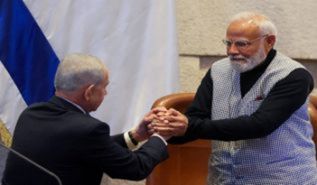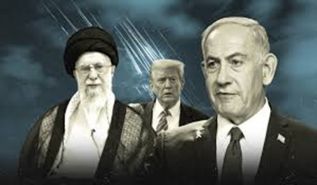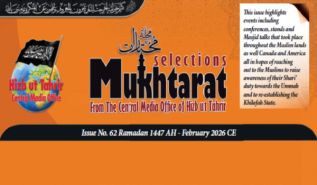بسم الله الرحمن الرحيم
Treaty of Al-Hudaybiyyah
(Translated)
Al-Waie Magazine Issue 151
Thirteenth Year, Sha'ban 1420 AH - December 1999 CE
https://www.al-waie.org/archives/article/2870
The Messenger of Allah (saw) stayed in Madinah on his return from the Battle of Banu Mustaliq, during Ramadan and Shawwal. He (saw) set out in Dhul-Qa'dah to perform Umrah, not intending to wage war, but rather to honor the Sacred House. He brought with him sacrificial animals, which were seventy camels, and called upon the Arabs and the Bedouins around him to go out with him. They were all around one thousand (Ibn Ishaq said they were seven hundred, estimating that every ten men had a camel). He (saw) entered ihram for Umrah from Dhul-Hulayfah to reassure that people would be safe from his war, and to know that he had only set out to visit and honor the Sacred House. When news of his departure reached the Quraysh, they came out to prevent the Messenger of Allah (saw) from entering the Blessed Masjid. They sent Khalid ibn al-Walid, who had not yet converted to Islam, with their cavalry. When news of this reached the Messenger of Allah (saw), he said,
«يا ويح قريش! لقد أكلتهم الحرب، ماذا عليهم لو خلّـوْا بيني وبين سائر العرب … فوالله، لا أزال أجاهد على الذي بعثني الله به حتى يظهره الله، أو تنفرد هذه السالفة»
“Woe to the Quraysh! The war has consumed them. What would they do if they left me alone with the rest of the Arabs? By Allah, I will continue to strive for that with which Allah has sent me until Allah makes it prevail, or this matter is resolved.”
Then the Messenger of Allah (saw) turned them away from the path they were on, and went out to Al-Hudaybiyyah from the lower part of Makkah. When the Quraysh cavalry that were with Khalid heard of this, they sent a message to their people informing them of the arrival of Muhammad (saw). As for the Messenger’s she-camel, it knelt down at Al-Hudaybiyyah, so the Messenger of Allah (saw) said, «حبسها حابس الفيل عن مكة، لا تدعوني قريش إلى خطة يسألوني فيها صلة رحم إلاّ أعطيتهم إياها»“He (swt) who held back the elephant from Makkah held her back. If the Quraysh invite me to a plan in which they ask me to maintain kinship ties, I will give it to them.”
Then the envoy delegations took place between the Messenger of Allah (saw) and the kuffar of Quraysh, and all the ambassadors of Quraysh returned with the same impression, which was that Muhammad (saw) did not want war, but rather came as a visitor to the Kaaba. It was planned by the Messenger of Allah (saw) to show the ambassadors the sacrificial animals he had brought to make sure that he intended to perform Umrah. One of the ambassadors of Quraysh, Urwah ibn Mas’ud Al-Thaqafi, saw the attachment of Muhammad’s Companions to their Messenger, so he returned to Quraysh and said, “O people of Quraysh, I have been to Khosrau in his kingdom, Caesar in his kingdom, and the Negus in his kingdom. By Allah, I have never seen a king among a people like Muhammad among his companions. I have seen people who would never surrender him for anything, so follow your opinion.”
Then the Messenger of Allah (saw) took the initiative to send an ambassador to the Quraysh, to inform them that Muhammad had not come to fight, but had come as a visitor and performer of the minor pilgrimage (umrah). He called upon Umar ibn al-Khattab (ra) to send him to Makkah. Ibn al-Khattab apologized, saying that he feared the Quraysh for himself, as he had no one in Makkah to protect him, and because of his intense enmity and harshness towards the Quraysh. He advised the Messenger of Allah (saw) to send Uthman ibn Affan (ra), so the Messenger of Allah (saw) sent him to Abu Sufyan and the notables of the Quraysh. Uthman went out to Makkah, and he was met by Aban ibn Said ibn al-As (ra), who embraced and protected him until he delivered the message of the Messenger of Allah (saw) to the nobles of Quraysh. They offered him to circumambulate (make tawaf) the House of Allah (saw), but Uthman refused unless the Messenger of Allah (saw) circumambulated it. Quraysh detained him there. The news reached the Messenger of Allah (saw), and the Muslims that Uthman (ra) had been killed. The Messenger of Allah (saw) called the people to pledge allegiance, and it was the Pledge of Ridwan under the tree, about which the Words of Allah (swt) were revealed,
[لَّقَدْ رَضِيَ اللَّهُ عَنِ الْمُؤْمِنِينَ إِذْ يُبَايِعُونَكَ تَحْتَ الشَّجَرَةِ فَعَلِمَ مَا فِي قُلُوبِهِمْ فَأَنزَلَ السَّكِينَةَ عَلَيْهِمْ وَأَثَابَهُمْ فَتْحًا قَرِيبًا]
“Allah was pleased with the believers when they swore allegiance to you, O Muhammad, under the tree. He knew what was in their hearts, so He sent down tranquility upon them and rewarded them with an imminent conquest.” [TMQ Surah Al-Fath 18]. It was narrated that the pledge of allegiance was for death, while Jabir ibn Abdullah said that the Messenger of Allah (saw) pledged allegiance to them that they would not flee. The Messenger of Allah (saw) pledged allegiance to Uthman (ra) by striking one hand with the other.
Then the Quraysh sent Suhayl ibn Amr to make peace with the Messenger of Allah (saw), on the condition that Muhammad and those with him go back that year. The peace was concluded on the condition that the Messenger of Allah (saw) would go back that year, and the following year he would come to perform Umrah, and he and his Companions (ra) would enter Makkah unarmed, except for the short swords in their scabbards. He (saw) would stay there for three days and then leave. There would be a peace treaty between him and them for ten years, during which people would intermingle and feel safe with one another. Any kafir who came to Muhammad as a Muslim would be returned to the kafireen (disbelievers), and any Muslim who came to the kafireen as an apostate would not be returned to the Muslims. This condition was so difficult for the Muslims that Umar ibn al-Khattab consulted Abu Bakr about it. Abu Bakr said to him, “O Umar, adhere to his orders, for I bear witness that he is the Messenger of Allah.” Then Ibn al-Khattab consulted the Messenger of Allah (saw), and the Messenger of Allah (saw) said,
«أنا عبد الله ورسوله، لن أخالف أمره، ولن يضيعني»
“I am the servant and Messenger of Allah (swt). I will not disobey His (swt) orders, and He (swt) will not let me down.” Khuza'a entered into the covenant and treaty of the Messenger of Allah, just as Banu Bakr entered into the covenant and treaty of the Quraysh.
Then Abu Jandal ibn Suhayl ibn Amr came, chained, and the Messenger of Allah (saw) returned him to the Quraysh, saying to him,
«يا أبا جندل، اصبر واحتسب، فإن الله جاعل لك ولمن معك من المستضعفين فرجاً ومخرجا»
“O Abu Jandal, be patient and seek reward, for Allah (swt) will make a way out and relief for you and for those who are weak with you.”
When the Messenger of Allah (saw) finished writing the peace treaty between him and the mushrikeen, he (saw) said to his Companions (ra), «قوموا فانحروا ثم احلقوا»“Get up, slaughter your sacrifices, and then shave your heads.” He (saw) wanted them to be released from their state of ihram so that they could return to Madinah without performing Umrah, but none of them responded. He repeated his call to them three times, but none of them responded. Then he went to Umm Salamah (ra) (it was his (saw) habit that one of his wives would accompany him on his military campaigns). He (saw) mentioned to her what he had encountered from the Muslims. She advised him to go out to the people and not speak to any of them, until he had slaughtered the sacrificial animals and shaved his head. He did so. When the Companions (ra) saw that, they got up and slaughtered their sacrifices, and some of them shaved each other’s heads, until some of them were about to harm each other out of grief. Umm Salamah’s (ra) advice was timely, and she spared the Muslims the Wrath of Allah (swt) and His Messenger (saw).
When the Messenger of Allah (saw) returned to Madinah, Abu Basir, a man from the Quraysh, who was a Muslim, came to him (saw). The Quraysh sent two men after Abu Basir, in implementation of the terms of the Treaty of Hudaybiyyah. The Messenger of Allah (saw) handed him over to the two men, and they went out with him until they reached Dhu al-Hulayfah. They stopped to eat some of their dates, and Abu Basir schemed against them. He took the sword of one of them and struck him with it, killing him. The other fled until he came to Madinah, complaining to the Messenger of Allah about Abu Basir’s actions. Abu Basir came and said, “O Prophet of Allah, Allah has fulfilled his promise to you. You returned me to them, and then Allah (swt) saved me from them.” Abu Basir understood that the Messenger of Allah (saw) would return him to them, so he went out until he reached the coast of the Arabian Sea. Likewise, Abu Jandal escaped from his enemies and joined Abu Basir. Everyone from the Quraysh who embraced to Islam joined Abu Basir until a group of them gathered, and began to intercept the Qurayshi trade caravans, killing them and taking their money.
This forced the Quraysh to send an envoy to the Messenger of Allah (saw), appealing to him by Allah (swt) and kinship, that whoever came to him would now be safe. So, the Prophet (saw) sent a letter for the group to come to Madinah. This then was the condition which was difficult for the Muslims to accept. This very condition became a calamity for the Quraysh, until they eventually gave it up. All that was from Allah’s Grace to our Prophet (saw) and to the Muslims.
The Treaty of Hudaybiyyah was a victory for the Muslims, as the Quraysh recognized the entity of Islam in Madinah and concluded a peace treaty with it. The cessation of the aggression of the kafir of Quraysh against the Muslims was a favorable opportunity for the Messenger of Allah (saw) to send his messengers to the ends of the Arabian Peninsula, and beyond, consolidating the universality of the Islamic Dawah. Finally, the Treaty of Hudaybiyyah was the path to the clear conquest of Makkah. Regarding the Treaty of Hudaybiyyah, Allah (swt) said,
[إِنَّا فَتَحْنَا لَكَ فَتْحًا مُّبِينًا]
“Indeed, We have granted you, O Muhammad, a clear conquest.” [TMQ Surah Al-Fath 1]. Al-Zuhri said, لم يكن فتح أعظم من صلح الحديبية، وذلك أن المشركين اختلطوا بالمسلمين، فسمعوا كلامهم، فتمكن الإسلام من قلوبهم، وأسلم في ثلاث سنين خلق كثير، وكثر بهم سواد الإسلام “There was no greater conquest than the Treaty of Hudaybiyyah, because the mushrikoon (polytheists) mingled with the Muslims, listened to their words, and Islam took root in their hearts. Within three years, many people embraced Islam, and the multitude of Muslims increased through them.”




